

Dissolution of the Soviet Union. The Union of Soviet Socialist Republics (USSR) formally ceased to exist on 26 December 1991.
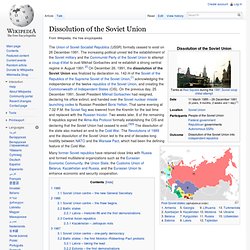
The increasing political unrest led the establishment of the Soviet military and the Communist Party of the Soviet Union to attempt a coup d'état to oust Mikhail Gorbachev and re-establish a strong central regime in August 1991.[2] On December 26, 1991, the dissolution of the Soviet Union was finalized by declaration no. 142-H of the Soviet of the Republics of the Supreme Soviet of the Soviet Union,[1] acknowledging the independence of the twelve republics of the Soviet Union, and creating the Commonwealth of Independent States (CIS). On the previous day, 25 December 1991, Soviet President Mikhail Gorbachev had resigned, declaring his office extinct, and handed over the Soviet nuclear missile launching codes to Russian President Boris Yeltsin. That same evening at 7:32 P.M. the Soviet flag was lowered from the Kremlin for the last time and replaced with the Russian tricolor. Nikolai Gogol. Nikolai Vasilievich Gogol (Russian: Никола́й Васи́льевич Го́голь, tr.
Nikolay Vasilyevich Gogol, IPA: [nʲɪkɐˈlaj vɐˈsʲilʲjɪvʲɪtɕ ˈgogəlʲ]; Ukrainian: Мико́ла Васи́льович Го́голь, Mykola Vasyliovych Hohol; 31 March [O.S. 19 March] 1809 – 4 March [O.S. 21 February] 1852) was a Ukrainian-born Russian dramatist, novelist and short story writer.[2] Early life[edit] Gogol was born in the Ukrainian Cossack village of Sorochyntsi,[2] in Poltava Governorate of the Russian Empire, present-day Ukraine. His mother was a descendant of Polish landowners. His father Vasily Gogol-Yanovsky, a descendant of Ukrainian Cossacks and who died when Gogol was 15 years old, belonged to the 'petty gentry', wrote poetry in Ukrainian and Russian, and was an amateur Ukrainian-language playwright. In 1820 Gogol went to a school of higher art in Nizhyn and remained there until 1828. In 1828, on leaving school, Gogol came to St Petersburg, full of vague but glowingly ambitious hopes.
Literary development[edit] D.S. Ivan Krylov. Ivan Andreyevich Krylov (Russian: Ива́н Андре́евич Крыло́в) (February 13, 1769 – November 21, 1844) is Russia's best known fabulist.
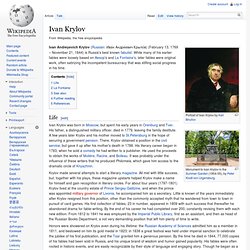
While many of his earlier fables were loosely based on Aesop's and La Fontaine's, later fables were original work, often satirizing the incompetent bureaucracy that was stifling social progress in his time. Life[edit] Ivan Krylov was born in Moscow, but spent his early years in Orenburg and Tver. His father, a distinguished military officer, died in 1779, leaving the family destitute. A few years later Krylov and his mother moved to St.Petersburg in the hope of securing a government pension. Krylov made several attempts to start a literary magazine. Krylov's statue in the Summer Garden (1854–55) is one of the most notable monuments in St.Petersburg. The Crystal Palace. Alexander Herzen. Life[edit] Herzen was born out of wedlock to a rich Russian landowner, Ivan Yakovlev, and a young German Protestant woman, Henriette Wilhelmina Luisa Haag from Stuttgart.
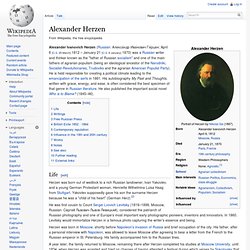
Yakovlev supposedly gave his son the surname Herzen because he was a "child of his heart" (German Herz).[2] He was first cousin to Count Sergei Lvovich Levitsky (1819–1898, Moscow, Russian: Сергей Львович Львов-Левицкий), considered the patriarch of Russian photography and one of Europe's most important early photographic pioneers, inventors and innovators. Fyodor Dostoyevsky. Vladimir Mayakovsky. Vladimir Vladimirovich Mayakovsky (Russian: Влади́мир Влади́мирович Маяко́вский; July 19 [O.S.
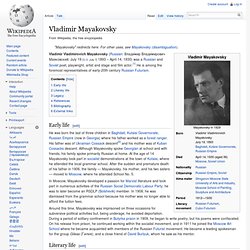
July 7] 1893 – April 14, 1930) was a Russian and Soviet poet, playwright, artist and stage and film actor.[1] He is among the foremost representatives of early-20th century Russian Futurism. Early life[edit] In Moscow, Mayakovsky developed a passion for Marxist literature and took part in numerous activities of the Russian Social Democratic Labour Party; he was to later become an RSDLP (Bolshevik) member. Shavarsh Karapetyan. Shavarsh Karapetyan (Armenian: Շավարշ Կարապետյան) is a retired Soviet Armenian finswimmer, a World and European champion, best known for saving the lives of 20 people in a 1976 incident in Yerevan.
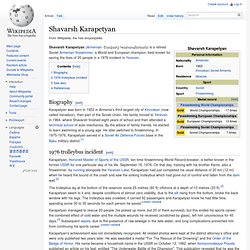
Biography[edit] Karapetyan was born in 1953 in Armenia's third largest city of Kirovakan (now called Vanadzor), then part of the Soviet Union. His family moved to Yerevan in 1964, where Shavarsh finished eight years of school and then attended a technical school of auto-mechanics. By the advice of family friends, he started to learn swimming at a young age. He later switched to finswimming. The Three Questions. "The Three Questions" is a short story by Russian author Leo Tolstoy first published in 1885[citation needed] as part of the collection What Men Live By, and other tales.
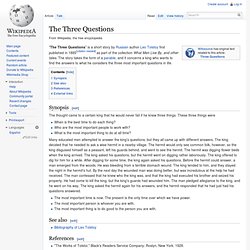
The story takes the form of a parable, and it concerns a king who wants to find the answers to what he considers the three most important questions in life. Synopsis[edit] The thought came to a certain king that he would never fail if he knew three things. These three things were When is the best time to do each thing? Many educated men attempted to answer the king's questions, but they all came up with different answers. The most important time is now. Clicking pictures has never been so much fun! - clikr.